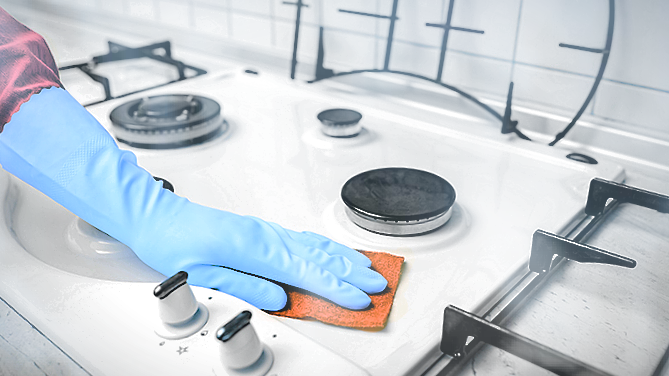When cleaning around the house, you should know that there are certain areas that you should pay more attention to. One of those areas is the kitchen, and yes, it is no one’s favourite place for cleaning but let’s be honest, what is? Kitchens are constantly used and abused. Food is prepared and eaten there and spills of grease happen all the time. Kitchen cleaning can be very annoying, especially if not done regularly.When grease and food build up, you will need a lot of time and effort to properly clean them. An important part of the kitchen is the stove – probably the most used place in the whole area. Here is some information about stove grates, how to clean them and how to properly maintain their good condition.

Stove tops are frequently used in the kitchen. Every time you cook on them food spills, grease splatters all around it and sometimes even a pot overflows. However, we should take regular care of our stove grates since they help reduce smoke odours, fires and also protect your pots from hard to remove stains. If you clean your stove tops on a regular basis, you will have a cleaner, healthier kitchen. We would like to show you ways in which you can clean your stove grates. First, we will discuss the two different kinds of grates most households have and at the end of the article, we will share some tips on how to preserve your grates for longer and keep them clean.However, if you think this is not for you and you can’t handle it, you can always turn to professional cleaning services.
Porcelain-coated cast iron stove grates are common in newer stoves. The cast iron conducts heat quickly and evenly while the porcelain coating makes cleaning easier. However, older stoves have uncoated cast iron grates that require different cleaning steps. With regular maintenance and simple supplies you can help either type stay clean and fresh.
Weekly cleaning is recommended ( that, of course, depends on how often you use your stove top). If a disaster occurs, you should clean the grates as soon as they cool down.
Here is what you will need:
- Large sink/bucket
- Small bowl
- Stiff bristled scrub brush
- Plastic wrap
- Microfibre cloths
- dishwashing liquid with a degreaser
- baking soda
- lemon juice
- vegetable oil
- paper towel
For porcelain coated cast iron grates
- Allow the burners, grates and cooktop to cool down completely before attempting any cleaning.
- Mix a solution of 1 tbsp of dishwashing liquid per 4 litres of water. Make sure the water is hot but not boiling.
- Place the grates in the hot water and leave them in for about 10 minutes. It is important to remember that grates with chipped or cracked porcelain coating should not be left to soak in water because cast iron will rust. If you have such an issue, use the method for uncoated cast iron grates. While the parts are soaking, clean the rest of the cooktop.
- After they are done soaking, scrub them with a stiff-bristled nylon brush, rinse them with clean water and dry them with a lint-free microfiber cloth.
- If there is some stuck on food that you did not manage to remove, make a baking soda paste. Mix 3 parts baking soda and 1 part water, stir well and apply to the grates. Let it sit for 20 minutes. Rinse the paste away and if it’s too hard, soak it in water until soft.
For uncoated cast iron grates
- In a small bowl mix 2 cups of hot water and 1 teaspoon of dishwashing liquid.
- Scrub the grates with a stiff bristled nylon brush, dipped in the hot, soapy solution. If there is some stubborn dirt that would not come off, sprinkle some baking soda on the damp grates. It will act as an abrasive and you will be able to get rid of the stuck on grease easier. Do not let cast iron grates soak
- When done with the scrubbing, rinse your grates under hot water and dry with a microfibre cloth immediately. Do not let them air-dry or rust may appear.
- After drying the grates, take a cloth and put some vegetable oil on it. Use it to spread the oil all over the grates. Apply a thin layer of oil. Place on a baking sheet and heat in the oven at 220 degrees for an hour. This will season the grates and prevent rusting.
- If there are rust spots on your grates, mix a paste of 1 cup baking soda and 1 tbsp lemon juice, apply on the rusty areas and wrap in plastic. Let the grates sit like this for 24h. Rinse and scrub the grates. Then rinse, dry and reseason them.
Tips on how to keep your grates clean for longer and prolong their life:
- Do not use harsh chemicals and strong abrasives
- Avoid cleaning your grates in the dishwasher and clean them by hand
- Clean the grates weekly
- Cover food with lids and do not allow them to boil over
- Try not to bang your grates with pans because chipping of the porcelain coating may occur.